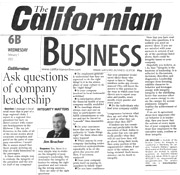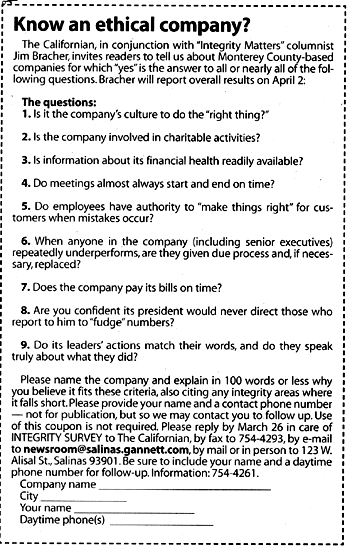Integrity
Matters
February 5, 2003
Ask
questions of company leadership
  Question: (E-022) I manage a local retail store that
is part of a large regional chain. I report to a Regional
Vice-President, but have no direct contact with corporate
headquarters in the Midwest. I like my job. However, in
the wake of all of the recent stories about corporate
corruption and greed on the parts of company executives,
I would like to assure myself that those people steering
my ship are really interested in the passengers.
Question: (E-022) I manage a local retail store that
is part of a large regional chain. I report to a Regional
Vice-President, but have no direct contact with corporate
headquarters in the Midwest. I like my job. However, in
the wake of all of the recent stories about corporate
corruption and greed on the parts of company executives,
I would like to assure myself that those people steering
my ship are really interested in the passengers.
Is
there some simple way to evaluate the integrity of the
president and the senior staff of my company?
 Response: Dear Concerned Local Manager:
Response: Dear Concerned Local Manager:
Yes,
there is a very simple way to evaluate the integrity of
your company's leadership. You determine the integrity
of leaders by asking the right questions and not tolerating
the wrong answers.
Here
are nine of the right questions:
-
Is
it generally understood by employees that they are expected
to do the right thing? Is it in the atmosphere of your
culture to do the "right thing?"
-
Is
your company involved in local (outreach) activities?
-
Is
information about the financial health of your company
readily available?
-
Do
meetings almost always start and end on time so that
participants can fulfill commitments to others and not
be forced to "cascade" time-insensitivity?
-
Do
your customers know that you have the authority to "make
things right" for them when mistakes happen?
-
When
anyone in your company (including senior executives)
under-performs repeatedly, are they given due process
and then, if necessary, replaced?
-
Does
your company pride itself on paying its suppliers in
timely ways?
-
Do
you have confidence that your president would never
direct those who report to him to "fudge"
numbers under any circumstances? (You will know the
answer to this question by the ways in which your boss
directs you to report your sales and profits, every
month, every quarter and every year.
-
Do
the individuals who lead your company exhibit "congruence
between what they say and what they do, as well as what
they say about what they did"?
If
leaders are not consistent and predictable in the execution
of their duties to the point that you can generally predict
what they will do and how they will go about doing their
work, then some portion of the organization's values,
if not most of the values, are being violated. Such inconsistency
can be death to integrity.
Now
that you have read these nine questions, it is unlikely
that you need an answer sheet. If you are not satisfied
with your answers to several, if not all, of the questions
listed above, there could be integrity issues at your
company.
Hopefully
you believe, as I do, that: "Integrity is the keystone
of leadership. It is reflected in discussions, decisions,
directives and diagnostics. Leadership emerges from listening,
exhibits character in behavior, and leverages energy with
integrity. Integrity is the stabilizing factor that sustains
effort and causes energy to create the canopy for accomplishment.
Integrity enables the achievement of Vision."
If
we are in agreement about how important ethical behavior
is in leadership, then, you know that the actions of every
member of your company, from front line employees to the
executive team, confirm or deny INTEGRITY.
JIM
BRACHER is founder of the Bracher Center for Integrity
in Leadership in Monterey. His column, "Integrity
Matters," appears Wednesday on the Business page.
Readers are invited to submit questions on business-related
ethics and values. Please write in care of INTEGRITY to
newsroom@salinas.gannett.com. The center's Web site is
www.brachercenter.com.
"Coupon"
published February 5 with the Integrity Matters
column

<<
back to Integrity Matters
main page
Home
Page | About Us | Ask
Bracher | Services |
Resources | Contact
Us
|